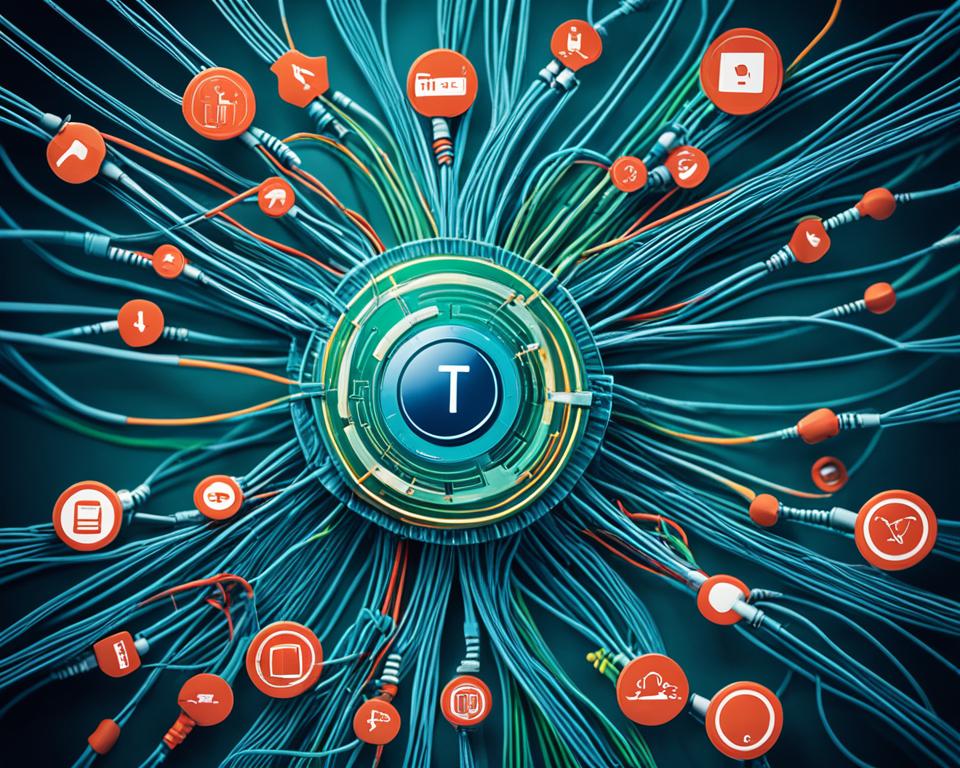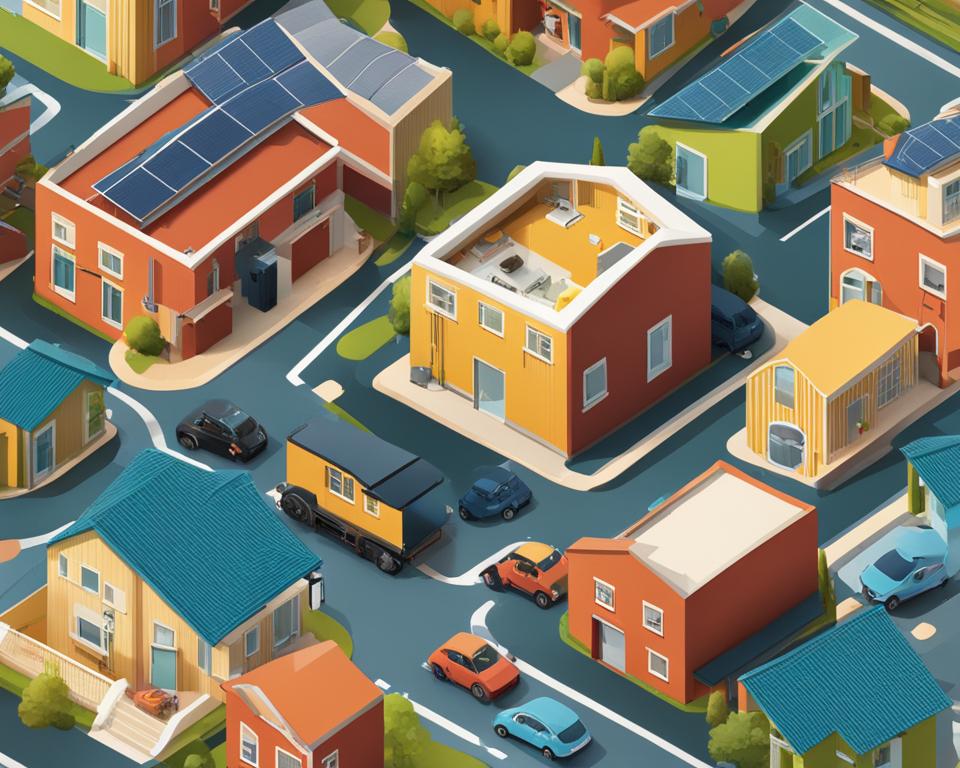Adverts
A Internet of Things (IoT) is technological revolution which allows the device interconnection physical resources via the Internet. This implies an intelligent exchange of data between these devices, enabling a more intelligent and integrated life. A IoT there are a lot applications in different sectors and is revolutionizing today's society.
Adverts
Main points
- A IoT allows the connecting devices physical resources over the Internet.
- This interconnection enables a more intelligent and integrated life.
- IoT has applications in different sectors, such as smart home, health and wellness, transportation and logistics, It is smart agriculture.
- However, the security, privacy It is standardization they are challenges important in IoT.
- IoT has a significant impact on society, improving efficiency, quality of life It is advances in industry and business.
What is the Internet of Things?
A Internet of Things, or IoT, refers to the device interconnection physical resources over the Internet, allowing them to collect and share data intelligently. These devices can range from simple sensors and actuators to more complex objects, such as household appliances, monitoring systems, vehicles and entire cities. The core of IoT lies in the ability of these devices to collect and transmit data independently, without direct human intervention.
A Internet of Things (IoT) has revolutionized the way we interact with connected devices. Now, everyday objects can exchange information and act autonomously, becoming part of an interconnected ecosystem. This interconnection and intelligent data collection have applications in different sectors, from home automation to industry and transport.
In IoT, physical devices are equipped with sensors, processors and Internet connectivity, allowing them to exchange information with each other and with management systems. This intelligent data exchange enables process automation, more accurate decision-making and the development of innovative solutions in various fields.
Adverts
| Benefits of the Internet of Things | Examples |
|---|---|
| Bigger efficiency and productivity | Smart energy monitoring in homes and businesses |
| Better quality of life and comfort | Smart home with remote control of devices and systems |
| Bigger security and monitoring | Alarm systems and cameras security connected |
| Optimization of logistics and transport | Real-time vehicle tracking and fleet management |
IoT is driven by the ability of devices to collect varied data and send it to the cloud, where it is stored and processed. From this data, it is possible to extract valuable insights to improve processes, develop new products and services and make decisions based on concrete data.
“The Internet of Things brings a world of possibilities to everyday life and business, connecting objects and people in previously unimaginable ways.” – CEO of IoT company
With the expansion of IoT, greater connectivity and device interconnection, as technologies such as 5G, artificial intelligence and machine learning are incorporated into the ecosystem. These emerging technologies will further drive innovation and pave the way for future of IoT, where smart devices will play an increasingly fundamental role in our daily lives.
IoT Applications in Various Sectors
IoT (Internet of Things) offers a wide range of applications in different sectors, driving the creation of a smart and integrated life. Below are some of the key areas where IoT is transforming the way we live and interact:
Smart home
In the era of smart home, IoT plays a fundamental role. With the connectivity provided by IoT, you can remotely control your home through devices such as smartphones or voice assistants. For example, you can program the automatic activation of lights and appliances, adjust the room temperature, and even monitor your home's security with smart camera systems. The smart home brings greater convenience, security and efficiency energy.
Health and wellness
IoT is also revolutionizing healthcare, with innovative applications that improve patient care. Wearable devices such as smart watches or bracelets can constantly monitor vital signs such as heart rate and physical activity levels. This data can be shared with healthcare professionals, facilitating patient and medication management in a more efficient and personalized way. IoT is expanding the possibilities for monitoring and caring for health, promoting people's general well-being.
Transportation and logistics
IoT plays an important role in the transportation and logistics, optimizing efficiency and safety on the roads. Sensors and connected devices in vehicles constantly monitor vital information such as location, traffic conditions, fuel consumption and maintenance. This data allows the planning of more efficient routes, the prevention of accidents and the reduction of operational costs. IoT is creating smarter, safer and more economical transportation.
Smart Farming
IoT is also revolutionizing the way agriculture is carried out, boosting the concept of smart agriculture. Connected sensors and devices allow farmers to monitor and control environmental variables such as soil moisture, temperature and nutrient levels. This data allows for more precise and efficient agricultural production, reducing the waste of natural resources, optimizing irrigation and ensuring plant health. A smart agriculture It is a sustainable solution to meet the growing demands for food around the world.
| Sector | IoT Applications |
|---|---|
| Smart home | Remote device control, security and energy efficiency |
| Health and wellness | Vital sign monitoring, patient and medication management |
| Transportation and logistics | Route optimization, road safety and reduction of operating costs |
| Smart Farming | Monitoring and control of environmental variables for more efficient and sustainable production |
These are just some of the many applications of IoT in various sectors. The connectivity provided by IoT is revolutionizing the way we live, work and interact with the world around us. The adoption of IoT will continue to grow, driving the development of increasingly innovative and transformative solutions.
IoT Challenges and Considerations
The Internet of Things (IoT) brings with it a series of challenges that need to be addressed to ensure its responsible and safe development. Follow some of the main ones below challenges and considerations related to IoT:
1. Data Security
Data security is one of the biggest concerns in the IoT era. With the number of connected devices constantly increasing, protection against cyber attacks and leaks of sensitive information becomes crucial. Robust security measures such as encryption and secure authentication must be implemented to ensure user data is protected.
2. Privacy
The collection and use of vast amounts of personal data by the IoT raises important questions about the privacy of individuals. It is essential to establish clear regulations for the responsible and ethical use of this data, ensuring users' informed consent and protecting their privacy.
3. Standardization and Interoperability
Lack of standardization It is interoperability between IoT devices makes integration and efficient communication difficult. It is necessary to establish common standards that allow compatibility and collaboration between different devices and platforms, facilitating interaction between them.
4. Ethical Considerations
The use of IoT raises ethical questions about the collection and use of personal data. It is important to ensure that data is obtained legally and ethic, respecting the rights of individuals and avoiding abusive practices. Clear regulations and transparency in the collection and use of data are essential to ensure an approach ethic of IoT.
5. Legislation
The absence of a legislation specific to IoT represents an additional challenge. It is necessary to establish clear laws that regulate the use of IoT, ensuring the protection of users' rights, data security and the responsibility of companies involved in the development and implementation of these technologies.
| Challenges | Measurements |
|---|---|
| Data Security | Implementation of secure encryption and authentication |
| Privacy | Clear regulations and informed user consent |
| Standardization It is Interoperability | Establishing common standards for compatibility and collaboration |
| Ethical Considerations | Respect for individuals’ rights and transparency in data collection and use |
| Legislation | Creation of specific laws to regulate the use of IoT |
For responsible and secure IoT development, it is essential to address these challenges and considerations in a careful and structured way. Only in this way can we make the most of the benefits that IoT has to offer, ensuring data protection, individual privacy and compliance with applicable laws and regulations.

The Impact of IoT on Society
The Internet of Things (IoT) has a significant impact on society, bringing benefits in several aspects, such as efficiency, quality of life It is advances in industry and business.
Efficiency and Sustainability
IoT improves efficiency in various sectors, allowing process optimization and waste reduction. An example is intelligent energy monitoring and control, which enables conscious consumption, reducing waste and contributing to sustainability. With IoT, companies can identify and correct problems quickly, avoiding unnecessary expenses and increasing operational efficiency.
Quality of life
IoT also improves people's quality of life, providing greater comfort and convenience in their daily lives. In the smart home, for example, it is possible to remotely control various devices, such as lighting, temperature and security, providing a more comfortable and safe environment. Furthermore, IoT has been applied in the health sector, with wearable devices that monitor users' health and facilitate medical care, improving quality of life and enabling disease prevention.
Advances in Industry and Business
IoT drives digital transformation in industry and business, bringing new opportunities and significant improvements. In industry, IoT makes it possible to optimize production, with machines and equipment connected in real time, allowing for more efficient management. Furthermore, IoT facilitates demand forecasting and the development of new products and services, improving companies' competitiveness. In business, IoT improves the customer experience through personalized and interactive solutions, in addition to allowing the collection and analysis of data for strategic decision making.

| Benefits of IoT in Society | Examples |
|---|---|
| Greater efficiency | Intelligent energy monitoring allows the reduction of consumption and emission of polluting gases. |
| Improved quality of life | A smart home offers comfort and convenience, providing a safer and more comfortable environment for residents. |
| Advances in industry and business | IoT enables production optimization, demand forecasting and improved customer experience, driving business growth. |
IoT has the potential to positively impact society, bringing more efficiency, quality of life and advances in the industrial and business sectors. As this technology continues to evolve, it is important to explore its full potential and overcome challenges to ensure a future better and more connected for everyone.
Public Policies, Security and Legislation
The Internet of Things (IoT) is constantly expanding, bringing with it a series of challenges in terms of data security and privacy. To ensure adequate protection of users and the ethical use of personal information, it is essential that public policy It is legislation specific to IoT.
One of the main measures adopted by Brazil in this regard is the General Law of Data Protection (LGPD), which came into force in 2020. This law establishes clear guidelines on the collection, storage and use of personal data, in addition to providing for sanctions for companies that fail to comply with its provisions. A National Authority in Data Protection (ANPD) is the entity responsible for monitoring compliance with the LGPD in the country.
In addition to specific legislation, the security of IoT devices is also essential to ensure the protection of personal data. Measures such as data encryption, secure authentication and regular operating system updates are essential to prevent cyber threats and privacy invasions.
“IoT security is a complex and constantly evolving challenge. It is crucial that the public policy and legislation are agile and adapt to the new threats and vulnerabilities that emerge every day.” – Digital security specialist
Furthermore, users' privacy must also be guaranteed. Clear regulations on data collection, use and sharing are necessary to prevent abuse and protect individual privacy. It's important to set limits and ensure users have control over their personal information.
In summary, the public policy, legislation and security measures are essential aspects to ensure data protection in the IoT era. The ANPD plays a fundamental role in monitoring and enforcing the LGPD, ensuring that companies and users comply with the established guidelines. By prioritizing data security and privacy, it is possible to take advantage of all the benefits provided by IoT in a responsible and ethic.
The Future of IoT
O future of IoT promises to be exciting, with the collaboration with others emerging technologies. The integration of IoT with artificial intelligence, for example, will drive innovation and expand possibilities. Furthermore, the arrival of 5G will further expand connectivity, opening doors to new opportunities. Collaboration and integration with emerging technologies will drive the growth of IoT and pave the way for new solutions and services.
Integration of IoT with Artificial Intelligence
“The integration of IoT with artificial intelligence represents a significant step in the evolution of this technology. The combination of these two areas will allow the development of more intelligent systems, capable of making autonomous decisions based on data collected in real time. This will have a huge impact on several sectors, such as health, transport and industry, enabling efficiency and quality gains never seen before.”
– Dr. Carlos Silva, IoT and AI specialist
The Role of 5G in the Evolution of IoT
“The arrival of 5G is one of the main promises to drive the future of IoT. With its ultra-fast connection speed and low latency, 5G will enable instant and reliable communication between IoT devices, paving the way for new advancements and applications. This will create an enabling environment for the growth of IoT in various sectors such as smart cities, autonomous vehicles and industry 4.0.”
– Laura Nunes, telecommunications engineer
Collaboration with Emerging Technologies
IoT is destined to collaborate and integrate with other emerging technologies, further enhancing its capabilities and functionalities. The fusion of IoT with areas such as virtual reality, blockchain and cloud computing will open new doors to innovative solutions and services that will transform the way we live and work.
Imagine, for example, a healthcare system connected to IoT and virtual reality, where doctors and patients can communicate immersively and remotely for consultations and exams. Or even, the application of IoT and blockchain in the supply chain, allowing products to be tracked and authenticated in real time, guaranteeing their origin and quality. These are just some of the infinite possibilities that will arise from collaboration between IoT and emerging technologies.
| Emerging Technologies | Benefits for IoT |
|---|---|
| Artificial intelligence | Autonomous decision-making capabilities and advanced data analysis |
| Virtual reality | Immersive communication and interactive experiences |
| Blockchain | Real-time data traceability and authentication |
| Cloud computing | Scalable storage and processing of large volumes of data |
The future of IoT is exciting, full of possibilities and advancements that will continue to transform our society. Collaboration with emerging technologies such as artificial intelligence, virtual reality, blockchain and cloud computing will drive the growth and innovation of IoT, providing increasingly intelligent and connected solutions.
Conclusion
The Internet of Things (IoT) is revolutionizing the way we live and interact with the world around us. That technological revolution It brings with it a series of advantages, such as greater efficiency, improved quality of life and significant advances in the industry.
However, IoT also presents important challenges that must be addressed. Ensuring data security and privacy is essential in this context of constant connectivity. Furthermore, it is crucial to address ethical issues in using and sharing this data.
As we move forward in this era of connectivity, it is essential that technology is developed in a sustainable and responsible way. IoT has the potential to deliver incredible benefits, but it is also necessary to ensure that it is deployed with ethics and security in mind. sustainability.
Therefore, we conclude that IoT is a technological revolution exciting but requires a careful approach. By facing these challenges responsibly, we will be prepared to reap all the benefits that IoT has to offer and build a better future for everyone.


 Announcements Today,
Announcements Today,